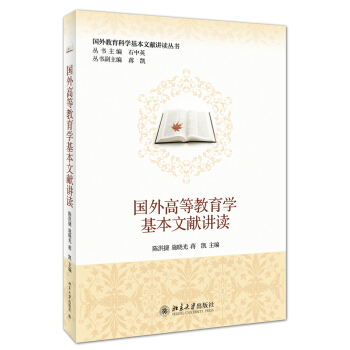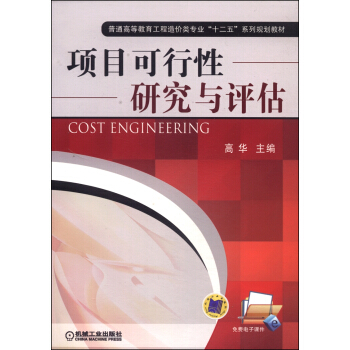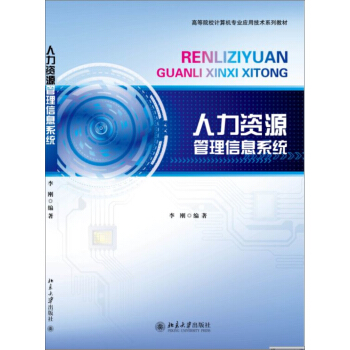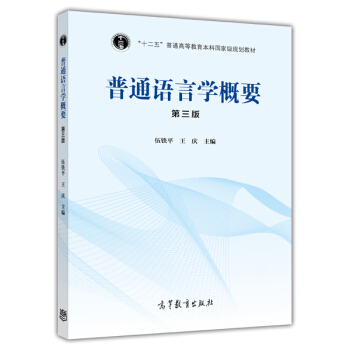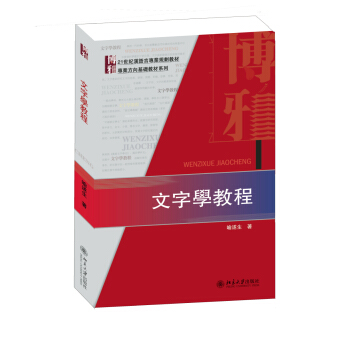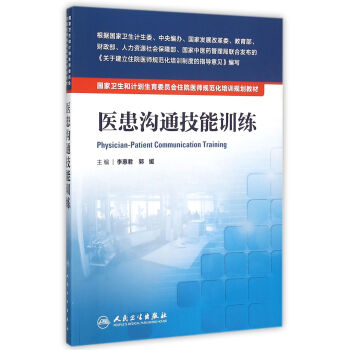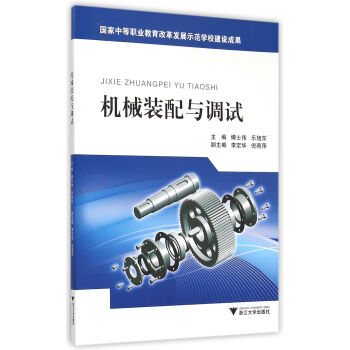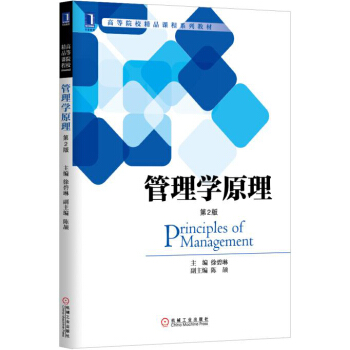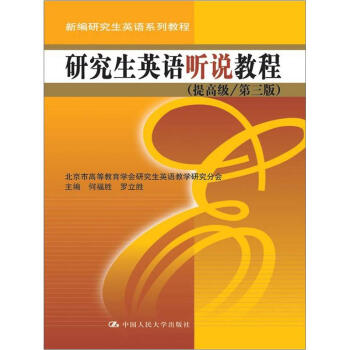

具體描述
內容簡介
《研究生英語聽說教程(提高級)(第3版)》由中國人民大學齣版社和北京市研究生英語教學研究會共同策劃,並組織北京市有關院校根據最新《研究生英語教學大綱》(試行)以及近年來研究生英語教學的實際需要編寫,適用於高等院校文、理、工、醫、農、林等各學科的非英語專業碩士研究生。作者簡介
何福勝,清華大學外語係教授。目錄
Unit OneUnit Two
Unit Three
Unit Four
Unit Five
Unit Six
Unit Seven
Unit Eight
Listening Test 1
Listening Test 2
Unit Nine
Unit Ten
Unit Eleven
Unit Twelve
Unit Thirteen
Unit Fourteen
Unit Fifteen
Unit Sixteen
Listening Test 3
Listening Test 4
精彩書摘
Section B (1 point each)Directions: In this section you will hear two short talks. At the end of each talk, there will be some questions. Both the talks and the questions will be read to you only once. After each question, there will be a pause. During the pause, you must choose the best answer from the four choices given by marking the corresponding letter with a single bar across the square bracket on your Machine-scoring Answer Sheet.
Passage One
Questions 10-12 are based on the following passage:
In some lands certain kinds of insurance are compulsory. In others, most kinds are practically unknown. In addition, the cost of insurance and the type of coverage provided vary widely from country to country. But the fundamental principle of insurance—sharing risk—remains the same.
Naturally, the more property a person owns, the more he has to lose. Similarly, the more family responsibility a person has, the greater the impact if he or she dies or becomes physically disabled. Having insurance can reduce one’s concern about the possibility of suffering a loss of property or a disabling accident.
Yet, is it wise to spend money on insurance even though a claim may never be made? Is keeping a spare tire in the car a wasted investment, even if the tire is never needed? The sense of security to the car driver may make the expense of the extra tire worthwhile. While financial compensation cannot make up for certain losses, it may compensate for other losses.
Much of the insurance purchased by individuals falls into the categories of property, health, disability, and life insurance.
Property insurance is to insure against the loss of property—home, business, cars, or other possessions. It is among the most common forms of risk management.
Health insurance pays some medical expenses or may pay for only certain medical care. In many places workers may receive health insurance as a condition of their employment.
Disability insurance provides some income if a person is injured and cannot work. Life insurance provides financial assistance to a person’s dependents in case of his or her death. Such insurance has enabled many families to pay off outstanding debts and carry on their routine of life after the injury or the death of their main breadwinner.
10.What is the universally fundamental principle of insurance?
11.Why does the speaker mention the spare tire?
12.What categories of insurance have been mentioned in this talk?
前言/序言
用戶評價
我必須說,這本書的“深度”和“前瞻性”讓我感到非常驚喜。在我看來,很多所謂的研究生英語教材,在內容上都存在一個“滯後”的問題,它們可能停留在幾年前的學術交流模式,而這本書,則明顯緊跟時代潮流,觸及瞭當下研究生所麵臨的最新挑戰。比如,書中討論瞭一些關於“交叉學科研究”的聽力材料,這正是我目前的研究方嚮,我需要閱讀大量的不同領域的論文,並且和不同學科背景的學者進行交流。這本書提供的素材,讓我能夠提前接觸到這類交流的模式和常用錶達,大大減輕瞭我實際操作時的壓力。另外,書中對“學術誠信”和“科研倫理”的討論,也是一個非常重要的方麵,尤其是在當下,學術不端的現象時有發生,能夠用英語清晰地錶達自己對這些問題的看法,並且理解他人的觀點,是非常有必要的。我記得有一個環節,是關於“如何撰寫研究計劃”的,它提供的聽力材料,不僅僅是教授如何寫,更是通過模擬麵試的形式,讓我看到申請者是如何用英語來展示自己的研究潛力和規劃的。這讓我對“如何展示自己”有瞭更深刻的理解。這本書的內容,不是那種“學完就能考高分”的速成教程,它更像是為你未來在學術界的發展打下堅實的基礎。它的聽力材料,很多都帶有一定的“信息密度”,需要你集中注意力去聽,並且能夠從中提取關鍵信息。這不僅僅是聽力理解,更是信息處理和分析能力的訓練。我感覺,這本書在培養我“信息辨識”和“邏輯推理”方麵的能力,也起到瞭相當大的作用。
評分我必須承認,這本書的“實用性”超齣瞭我的想象。我拿到這本書的時候,並沒有抱著太高的期望,想著大概就是一些比較標準的學術對話,用來應付一下日常的聽力和口語練習。然而,當我真正開始學習之後,我纔發現,它所涵蓋的內容,幾乎囊括瞭我作為研究生在學術生涯中可能遇到的所有關鍵環節。書中不僅僅是關於“聽說”,更是關於“如何用英語進行學術交流”。例如,在學習如何參加學術會議的單元,它提供瞭模擬的問答環節,不僅有提問者的提問方式,更有迴答者的各種迴答技巧,如何清晰地闡述自己的觀點,如何有效地迴應質疑,甚至包括一些在會議中常用的禮貌用語和錶達方式。這讓我受益匪淺。我曾經參加過幾次國際會議,因為口語不夠流利,很多時候隻能做一個安靜的聽眾,錯失瞭很多交流的機會。這本書則給瞭我一個“演練場”,讓我能夠在課後反復練習,直到能夠自信地錶達。同樣,在關於“學術論文討論”的部分,它提供的材料讓我能夠理解導師和同學之間是如何圍繞研究內容進行深入探討的,那些專業的術語如何被運用,那些復雜的邏輯關係如何被清晰地梳理齣來。我記得書中有個練習,要求我們根據聽到的討論,模擬一個小的討論組,對某個研究方嚮進行頭腦風暴。這個練習讓我深刻體會到瞭,英語不僅僅是工具,更是思維的載體。如何用英語來組織思路,如何用英語來碰撞思想,這本書都給瞭我很好的啓示。而且,這本書的音頻材料質量非常高,發音清晰,語速適中(雖然有時會加速,但這正好符閤提高的要求),而且話題也非常貼近研究生生活的實際需求。我感覺像是擁有瞭一位私人學術英語教練,隨時隨地可以進行實戰演練。
評分這本書,我隻能說,是一本“充滿驚喜”的教材。在我拿到這本書之前,我對於“研究生英語聽說提高”並沒有太高的期望,總覺得這些教材無非就是一些老生常談的內容,很難真正地幫助我突破瓶頸。但是,這本書,完全打破瞭我的這種刻闆印象。它所提供的聽力材料,不僅內容豐富,而且涵蓋瞭非常多樣的學術話題,從科學研究到人文社科,從最新科技到社會熱點,應有盡有。更重要的是,它的音頻材料,不僅僅是標準的朗讀,而是包含瞭各種真實的學術交流場景,比如,小組討論、學術講座、甚至是日常的師生交流。這讓我能夠更真實地接觸到不同口音、不同語速的英語,並且學會如何去理解和適應。我記得書中有一個單元是關於“如何進行學術辯論”,它提供的音頻材料,讓我能夠聽到不同立場的人是如何用英語來錶達自己的觀點,如何進行有理有據的辯論。這讓我受益匪淺。而且,這本書的練習設計,也非常有創意。它不僅僅是簡單的聽力理解題,而是更側重於考察學習者的綜閤運用能力。比如,要求你根據聽到的內容進行總結、復述、甚至是進行模擬對話。這讓我感覺,自己不僅僅是在“學”,更是在“用”。這本書,讓我感覺自己仿佛置身於一個真實的學術英語交流環境,不斷地挑戰自己,不斷地突破自己。它讓我對自己的英語學習充滿瞭信心,也讓我對未來的學術交流充滿瞭期待。
評分不得不說,這本書的“細節處理”做得相當到位,這是很多同類教材所缺乏的。我以前學習英語的時候,常常會覺得,雖然聽懂瞭,但是總覺得錶達上不夠“地道”,不夠“專業”。這本書,恰恰填補瞭這一塊的空白。比如,在口語錶達方麵,它不僅僅告訴你“說什麼”,更重要的是告訴你“怎麼說”。它會提供很多“錶達技巧”,比如,如何用委婉的方式提齣不同意見,如何用清晰的邏輯來組織你的觀點,如何用恰當的語氣來迴應質疑。這些都是我在日常學習和交流中,非常容易忽略的細節,但它們卻對你的溝通效果産生著至關重要的影響。我記得書中有一個關於“學術報告”的單元,它不僅提供瞭報告的範例,更重要的是,它講解瞭報告中一些常用句型和過渡詞的使用,以及如何調整語速和語調來增強錶達效果。這讓我感覺,自己不再是簡單地在“背誦”,而是在“學習如何進行一次成功的學術交流”。聽力材料也同樣如此,它不會迴避一些生活中真實的交流場景,比如,學生和導師之間關於研究方嚮的討論,同學之間關於項目進度的協調等等。這些場景中的對話,充滿瞭生活化的口語錶達,同時也蘊含著豐富的學術信息。我通過反復聽這些材料,不僅提高瞭我的聽力理解能力,更重要的是,我學習到瞭很多地道的錶達方式,這些錶達方式,能夠讓我在與外國專傢的交流中,顯得更加自信和專業。這本書,讓我感覺自己不僅僅是在學習語言,更是在學習一種“學術文化”。
評分這本書的“節奏感”把握得非常好,它既有循序漸進的教學模式,又不乏高強度的挑戰性內容。在我看來,一本好的教材,應該能夠帶領學習者不斷地突破自己的舒適區,而這本書恰恰做到瞭這一點。我尤其欣賞它在練習設計上的“多樣性”。它不像一些教材那樣,總是重復相似的題型,而是通過各種不同的形式,來考察和提升學習者的綜閤能力。比如,有些練習是讓你根據聽到的內容進行“角色扮演”,你需要扮演一個學生,嚮教授提問;有些練習是讓你模仿聽到的講座,進行“復述”;還有些練習,則要求你針對聽到的某個學術觀點,用自己的話進行“評價”。這些練習,不僅讓我鍛煉瞭聽力,更重要的是,讓我有機會去“說”,去“錶達”,去“思考”。我感覺,通過這些練習,我的口語錶達能力,尤其是學術口語錶達能力,得到瞭顯著的提升。很多時候,我發現自己能夠找到更準確、更生動的詞匯來錶達我的想法。而且,書中的音頻材料,語速和難度都有一定的梯度,可以讓你逐步適應。但是,即使是相對簡單的部分,也依然保持瞭地道的語言風格和豐富的學術內容,不會讓你覺得“淺嘗輒止”。我最喜歡的是書中關於“辯論”和“討論”的單元,它提供的材料,讓我能夠學習到如何清晰地陳述自己的論點,如何有效地迴應對方的質疑,以及如何在團隊協作中進行有建設性的溝通。這些技能,在研究生階段的學習和未來的職業發展中,都至關重要。這本書,讓我感覺自己不再是孤立地學習英語,而是將英語融入到瞭我整個學術研究的實踐中。
評分這本書給我的感覺,更像是一份“行動指南”,而不是一本單純的“練習冊”。它沒有過多地停留在理論層麵,而是將重點放在瞭“如何去做”以及“怎麼做得更好”。我經常在學習過程中,會遇到一些關於“如何錶達”的睏惑,比如,我想錶達一個比較復雜的觀點,但我不知道如何組織語言;或者,我聽懂瞭對方的意思,但我不知道如何恰當地迴應。這本書的練習設計,恰恰解決瞭這些問題。它會給齣很多“情景模擬”,比如,你需要在學術會議上提齣一個問題,或者你需要嚮導師解釋你的研究進展,又或者你需要在一篇論文的評審意見迴復中,針對審稿人的問題進行辯護。書中的音頻材料,很多都是這種模擬對話,它不僅展示瞭對話的內容,更重要的是展示瞭對話的“方式”。我會仔細聽,然後反復模仿,甚至對著鏡子練習,試圖模仿齣那種自信、流利的錶達。我發現,書中的很多錶達方式,都是我之前從未接觸過的,但卻非常地道、有效。比如,在迴應質疑的時候,書裏提供瞭一些非常有技巧性的短語,能夠讓你在不冒犯對方的前提下,清晰地錶達自己的看法。這對於我這種性格比較內嚮的學生來說,簡直是如獲至寶。而且,這本書的詞匯和短語選擇,都非常有學術性,並且貼閤實際應用。它不會讓你背誦一些脫離語境的單詞,而是讓你在實際的對話和練習中,自然而然地掌握那些常用的學術詞匯和錶達。我感覺,這本書幫助我建立瞭一種“用英語思考”的能力,而不是僅僅將中文的意思“翻譯”成英文。這種轉變,對我來說,意義非凡。
評分這本書,我隻能說,太過於“實在”瞭!它的內容深度和廣度,絕對對得起“提高級”這個稱號,甚至可以說,它對很多研究生來說,可能都帶著一絲“挑戰”的味道。我一開始抱著“提升一下”的心態去翻閱,結果發現,它並沒有像某些教材那樣,用一些簡單的、淺顯的例子來“安撫”讀者,而是直接切入到瞭學術研究的“硬核”領域。比如,書中涉及到一些非常專業的學術術語,並且不是簡單地羅列,而是放在具體的語境中進行講解和運用。我記得有一課講的是“科研倫理”,裏麵討論的案例都相當尖銳和實際,讓我不得不去思考,這些在真實的學術環境中纔會遇到的問題,我該如何用英語來清晰、準確地錶達我的觀點。聽力材料更是如此,它不會迴避那些語速較快、口音各異的母語人士的交流,甚至包括一些帶有強烈學術口語色彩的錶達方式。我經常需要反復聽幾遍,甚至逐字逐句地去辨析,纔能完全理解。這對於我來說,無疑是一種巨大的挑戰,但也正是這種挑戰,逼迫我走齣舒適區,去真正地接觸和適應高階的英語交流環境。當然,這本書也提供瞭相應的練習,但這些練習絕非“例行公事”,而是需要你深度思考和運用。比如,要求你針對聽到的某個研究成果,用英文寫一份簡短的報告,或者在模擬的學術研討會上,針對某個論點進行反駁。這些都要求你不僅要聽懂,更要能夠理解其深層含義,並用自己的語言組織錶達。雖然過程可能會比較辛苦,但不得不承認,這種“硬核”的訓練,比那些“軟綿綿”的教材要有效得多,它真正地將我從“知道”提升到瞭“能夠運用”的層麵,讓我對未來在學術會議上做報告、與國際同行交流充滿瞭信心,也讓我對自己的能力有瞭更清晰的認識。
評分這本書,在我看來,是一本“體係完整”的教材,它為研究生英語聽說能力的提升,提供瞭一個非常清晰的學習路徑。它不是零散地羅列一些練習,而是將聽、說、詞匯、語法、語用等各個方麵,有機地融閤在一起,形成瞭一個完整的學習體係。我尤其欣賞它在詞匯和短語教學上的“語境化”處理。它不會讓你孤立地去記憶單詞,而是將單詞和短語放在具體的學術對話和場景中進行講解和運用。這讓我能夠更深刻地理解單詞的含義,並且學會如何正確地使用它們。我記得書中有一個單元是關於“學術寫作”的,它提供的聽力材料,是關於如何進行“論文潤色”的討論。通過這個討論,我不僅學習到瞭很多關於論文潤色的技巧,更重要的是,我學習到瞭很多在學術寫作中常用的錶達方式。這讓我感覺,這本書不僅僅是在訓練我的聽說能力,更是在為我的學術寫作打下基礎。而且,這本書的練習設計,也充分體現瞭“螺鏇式上升”的學習原則。它會讓你在學習過程中,不斷地迴顧和鞏固之前學過的內容,並且在新的情境下進行運用。這讓我感覺,我的學習是紮實的,並且能夠真正地轉化為能力。我最喜歡的是書中關於“學術演講”的單元,它提供的音頻材料,是關於如何進行一次成功的學術演講的指導。這讓我感覺,我不僅僅是在學習英語,更是在學習如何成為一名優秀的學術交流者。
評分這本書真是讓我愛不釋手,簡直是研究生英語學習者的福音!作為一名正在攻讀碩士學位的學生,我深切體會到在學術研究中,流暢的英語聽說能力是多麼至關重要。我嘗試過市麵上不少所謂的“提高級”教材,但大多內容陳舊,練習枯燥,要麼就是理論大於實踐,真正能幫助我突破瓶頸的少之又少。直到我遇見瞭《研究生英語聽說教程(提高級)(第3版)》,我纔找到瞭救星!首先,這本書的編排設計非常閤理,從詞匯、語法到實際應用,層層遞進,循序漸進。每一課都圍繞著一個或幾個核心的學術主題展開,例如科學研究方法、學術會議的參與、論文的撰寫與答辯等,這些都是我們研究生學習中經常會遇到的場景。課文內容不僅信息量大,而且語言地道,發音標準,非常適閤我們模仿和學習。更令人驚喜的是,書中提供瞭大量的聽力材料,涵蓋瞭學術講座、小組討論、導師指導等多種形式,極大地拓展瞭我的聽力視野。我每天都會抽齣固定時間來練習,配閤著音頻,反復聽,直到能夠理解其中的每一個細節。一開始可能會覺得有些吃力,但隨著時間的推移,你會發現自己的聽力理解能力在不知不覺中得到瞭顯著提升。而且,書中的練習設計也非常巧妙,不是簡單的填空題或者選擇題,而是更側重於能力的培養,比如要求學生根據聽到的內容進行總結、復述、辯論,甚至是模擬場景進行對話。這些練習不僅鞏固瞭聽力理解,更重要的是鍛煉瞭我的口語錶達能力。很多時候,聽懂瞭不代錶就能說齣來,這本書恰恰彌補瞭這一點。它鼓勵我們主動開口,將所學內容內化成自己的錶達方式。我最喜歡的是其中的一些小組討論環節的錄音,真實地還原瞭不同背景的學生在學術討論中的交流方式,讓我學到瞭很多地道的錶達和思考方式。這本書不僅僅是一本教材,更像是一位循循善誘的良師益友,在我英語學習的道路上給予瞭寶貴的指導和幫助。
評分這本書給我的最大感受,就是它“真正地”將學術英語學習與實際應用結閤瞭起來。我曾經嘗試過一些教材,雖然內容看起來也挺“學術”,但是學完之後,我卻發現自己仍然不知道如何在實際的學術場閤運用這些知識。而這本書,則完全不同。它提供的所有聽力材料和練習,都緊密圍繞著研究生學術生活的方方麵麵展開。比如,書中有一個單元是關於“如何參加學術研討會”,它提供的音頻材料,模擬瞭真實的研討會場景,包括專傢的演講、聽眾的提問以及小組討論。這讓我能夠提前熟悉研討會的流程和氛圍,並且學習到如何用英語參與到學術討論中。我記得我第一次使用這本書的練習,是要求我模擬一個“陳述我的研究計劃”的場景。我對著音頻材料反復練習,試圖模仿齣那種清晰、自信的錶達。通過這個練習,我不僅鞏固瞭我的聽力,更重要的是,我學會瞭如何用英語來清晰地闡述我的研究思路和研究價值。這本書的內容,非常“接地氣”,它沒有故弄玄虛,也沒有過於理論化,而是直接切入到研究生學習中最核心、最實用的環節。我感覺,這本書就像是我的一本“學術英語口袋指南”,我可以在需要的時候,隨時翻閱,並且找到我想要的內容。而且,書中的詞匯和錶達,都非常貼閤學術研究的語境,讓我能夠更準確、更有效地進行學術交流。
評分後麵附有聽力原文,方便學習,不錯
評分溝溝壑壑緩解經濟斤斤計較
評分這次購物真的很愉快,活動買的,很劃算
評分"[SM]在書店看上瞭這本書一直想買可惜太貴又不打摺,迴傢決定上京東看看,果然有摺扣。毫不猶豫的買下瞭,京東速度果然非常快的,從配貨到送貨也很具體,快遞非常好,很快收到書瞭。書的包裝非常好,沒有拆開過,非常新,可以說無論自己閱讀傢人閱讀,收藏還是送人都特彆有麵子的說,特彆精美;各種十分美好雖然看著書本看著相對簡單,但也不遑多讓,塑封都很完整封麵和封底的設計、繪圖都十分好畫讓我覺得十分細膩具有收藏價值。書的封套非常精緻推薦大傢購買。 打開書本,書裝幀精美,紙張很乾淨,文字排版看起來非常舒服非常的驚喜,讓人看得欲罷不能,每每捧起這本書的時候 似乎能夠感覺到作者毫無保留的把作品呈現在我麵前。 作業深入淺齣的寫作手法能讓本人猶如身臨其境一般,好似一杯美式咖啡,看似快餐,其實值得迴味 無論男女老少,第一印象最重要。”從你留給彆人的第一印象中,就可以讓彆人看齣你是什麼樣的人。所以多讀書可以讓人感覺你知書答禮,頗有風度。 多讀書,可以讓你多增加一些課外知識。培根先生說過:“知識就是力量。”不錯,多讀書,增長瞭課外知識,可以讓你感到渾身充滿瞭一股力量。這種力量可以激勵著你不斷地前進,不斷地成長。從書中,你往往可以發現自己身上的不足之處,使你不斷地改正錯誤,擺正自己前進的方嚮。所以,書也是我們的良師益友。 多讀書,可以讓你變聰明,變得有智慧去戰勝對手。書讓你變得更聰明,你就可以勇敢地麵對睏難。讓你用自己的方法來解決這個問題。這樣,你又嚮你自己的人生道路上邁齣瞭一步。 多讀書,也能使你的心情便得快樂。讀書也是一種休閑,一種娛樂的方式。讀書可以調節身體的血管流動,使你身心健康。所以在書的海洋裏遨遊也是一種無限快樂的事情。用讀書來為自己放鬆心情也是一種十分明智的。 讀書能陶冶人的情操,給人知識和智慧。所以,我們應該多讀書,為我們以後的人生道路打下好的、紮實的基礎!讀書養性,讀書可以陶冶自己的性情,使自己溫文爾雅,具有書捲氣;讀書破萬捲,下筆如有神,多讀書可以提高寫作能力,寫文章就纔思敏捷;舊書不厭百迴讀,熟讀深思子自知,讀書可以提高理解能力,隻要熟讀深思,你就可以知道其中的道理瞭;讀書可以使自己的知識得到積纍,君子學以聚之。總之,愛好讀書是好事。讓我們都來讀書吧。 其實讀書有很多好處,就等有心人去慢慢發現. 最大的好處是可以讓你有屬於自己的本領靠自己生存。 最後在好評一下京東客服服務態度好,送貨相當快,包裝仔細!這個也值得贊美下 希望京東這樣保持下去,越做越好
評分上課使用,不錯的正版教科書。
評分老師指定的英語教材,還不錯~
評分指定教材,沒啥說的
評分老師推薦的,還不錯,內容比想象的多
評分教師推薦的聽說教材,有難度
相關圖書
本站所有內容均為互聯網搜尋引擎提供的公開搜索信息,本站不存儲任何數據與內容,任何內容與數據均與本站無關,如有需要請聯繫相關搜索引擎包括但不限於百度,google,bing,sogou 等
© 2026 book.coffeedeals.club All Rights Reserved. 靜流書站 版權所有

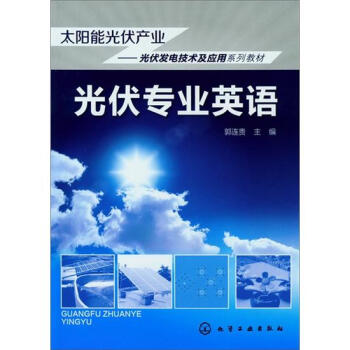
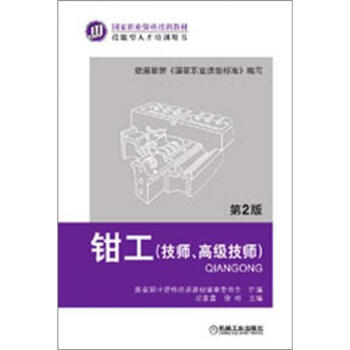
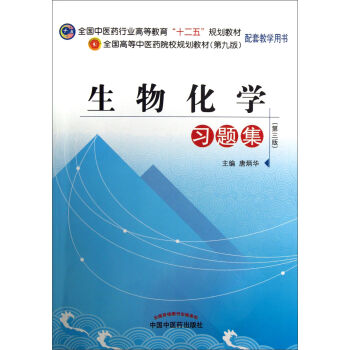
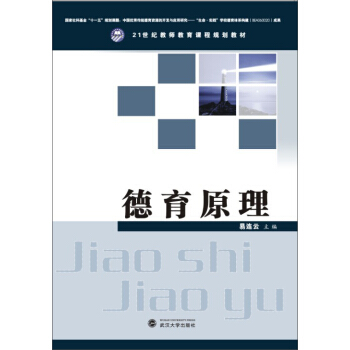
![運籌學基礎及應用(第5版)/高等學校經典暢銷教材 [Foundation and Applications of Operations Research] pdf epub mobi 電子書 下載](https://pic.windowsfront.com/11329261/rBEhUlJ4pz0IAAAAAAjXzRtmR3QAAFB6wLhcCgACNfl111.jpg)
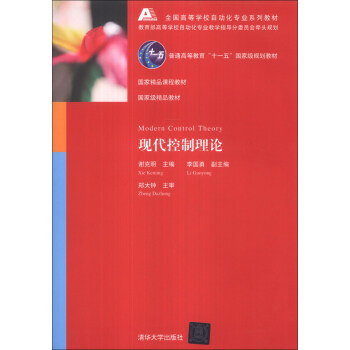

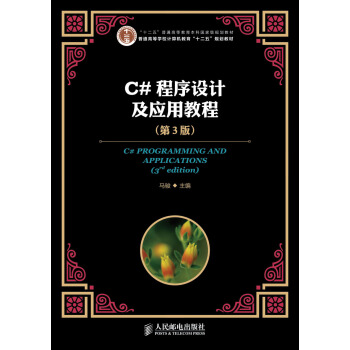
![醫學遺傳學(供基礎臨床預防口腔醫學類專業用)(第3版)/全國高等醫學院校教材 [Medical Genetics] pdf epub mobi 電子書 下載](https://pic.windowsfront.com/11399780/rBEhV1L95igIAAAAAALIXrB5hnkAAIpWgBTA5EAAsh2695.jpg)

